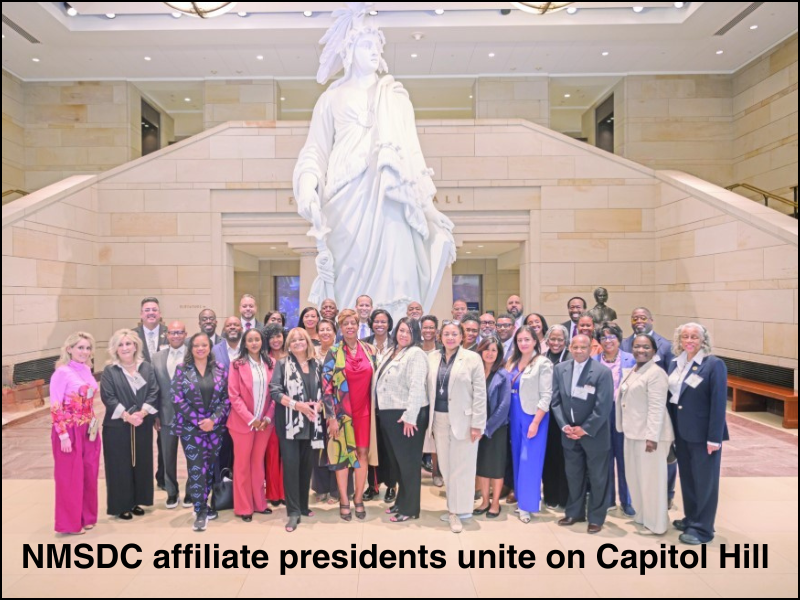Recently,
19 presidents representing the regional affiliates of the National Minority
Supplier Development Council Inc. (NMSDC) converged on Capitol Hill for the
2025 Day on the Hill. The purpose: to educate and raise awareness among
Congressional leaders about the growing threats to programs that support the
nation’s minority-owned businesses and to advocate for continued investment in
equitable economic opportunity.
For more
than 50 years, NMSDC has served as the nation’s leading advocate for minority
business enterprises (MBEs), driving $548 billion in annual economic output,
supporting over 2 million jobs, and generating $149 billion in wages through
its network of 23 regional affiliates and more than 1,700 corporate members.
During the
fly-in, affiliate presidents, minority business owners, and affiliate board
chairs met with members of Congress and their staff to discuss urgent policy
priorities, including preserving funding for the Minority Business Development
Agency (MBDA), protecting supplier diversity and 8(a) programs, and opposing
proposed cuts to the Small Business Administration (SBA) that could hinder
access to federal contracting and capital for minority entrepreneurs.
“This visit
to Capitol Hill was about more than advocacy — it was about survival and
progress,” said Sharon R. Pinder, President and CEO of the Capital Region
Minority Supplier Development Council and Chair of the NMSDC Affiliate
Council’s Public Policy Committee. “Minority business programs are under attack
at every level of government. Yet history has shown that when minority-owned
businesses thrive, America’s economy grows stronger. We came to Washington to
make sure Congress understands that these programs aren’t just about fairness —
they’re about the nation’s economic competitiveness.”
Patricia
Crenshaw, CEO of the Pacific Southwest Minority Supplier Development Council
and chair of the NMSDC Affiliate Presidents Council, added: “Our regional
affiliates are on the front lines — connecting more than 17,000 minority-owned
businesses to opportunities with Fortune 500 companies and government agencies.
The data and stories we bring from our regions reflect both the challenges and
the promise of these enterprises. We are urging Congress to stand firm in
defending all programs that create a pathway to equity and prosperity.”
The
affiliate presidents highlighted the tangible impact of federal and local
support programs, citing MBDA-funded initiatives and corporate partnerships
that have driven measurable increases in contracting, job creation, and
business expansion nationwide. They also called for Congressional field
hearings and roundtables to document the challenges faced by minority-owned
firms, collect local data, and bring transparency to persistent marketplace
inequities.
“We are
sending a clear message,” Pinder said. “Defunding or dismantling these programs
would not only harm minority businesses — it would weaken communities, reduce
tax revenue, and limit America’s ability to compete globally. This is a fight
for the future of our economy.”





